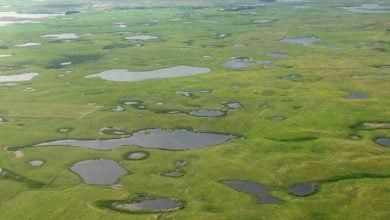Tina Landis is the author the new book, Climate Solutions: Beyond Capitalism, published by Liberation Media.
Since taking office, the aggressively anti-environment, anti-people Trump regime has overturned nearly 100 environmental regulations — 34 of which are still being fought in the courts. The rollbacks include lifting restrictions on power plants, vehicle emissions, extractive industries and toxic substances, opening up protected lands for drilling, and overturning laws protecting water and wildlife. I won’t go into all the details of each law that is being rolled back — you can find a list of all of them here.
These rollbacks will increase greenhouse gas emissions just two years after scientists warned that we have only 12 years to drastically cut emissions in order to avert complete climate catastrophe.
While Trump and his cabal of pro-corporate lackeys are particularly extreme in their disregard for the survival of our species, I want to put this into the broader perspective of the U.S. environmental policy of the last four decades. Beginning with the Reagan era of the 1980s with the first major cuts to EPA funding, U.S. presidents have been slowly chipping away at environmental protections.
Under Obama, we saw the rise of some of the most environmentally destructive fossil fuel extraction through fracking and tar sands. Extraction of these extreme fossil fuels causes massive environmental destruction and increases emissions in the process.
Natural gas, which was touted as a bridge energy source in the process of moving from coal to renewables, releases more emissions than it saves due to methane leaks from extraction through distribution, which heats the atmosphere 80 times more than CO2 in the short-term. (NPR)
Fracking also uses billions of gallons of water annually and leaves behind billions of gallons of toxic wastewater; toxic fracking fluid leaks into surrounding groundwater poisoning residents, and earthquakes near drilling sites are occurring where no seismic activity was seen prior.
Tar sands extraction is poisoning Indigenous communities, causing birth defects and destroying massive tracts of wilderness — as of 2017 more than 2 million acres of boreal forest have been lost. For every barrel of tar sands crude extracted, 3 barrels of water are used leaving behind toxic tailing ponds the size of 500,000 Olympic-size swimming pools. Acid rain is now plaguing the remote once-pristine region of Alberta. (National Geographic)
My point is that these environmentally destructive policies are bipartisan and always in favor of corporate profits. One side just tends to put more effort into the “green” facade for public consumption.
Overall, the United States is nowhere near doing its part to reach the target set forth in the 2016 UN Paris Agreement to keep global temperatures below 2 degrees Celsius of warming, much less the more conservative 1.5 degree limit that is crucial to protect island and coastal communities.
The United States, which is the biggest per capita polluter on the planet, has failed to reduce greenhouse gas emissions below 1990 levels, despite the requirement of an 80 percent reduction from 1990 levels in order to attain the 2 degree target. (EPA)
The gains for environmental protections that were won in the 1970s were a direct result of the mass people’s movement demanding action and were part of a global mass upsurge at the time. But under capitalism, the ruling class always takes advantage of an ebb in progressive movements to take back back the gains that hinder profits. This is the class struggle. And that struggle has always seen an ebb and flow of reaction and progress across all issues from women’s rights, to civil rights, and the environment. But with a renewed and sustained resurgence of the people’s movement, those gains can be won back, with the understanding that the capitalist vultures will always be circling looking for an opening to reverse them.
In the end we need socialism, a system run by and for the workers to meet the needs of all people and the planet. We need a planned economy where the workers determine what is needed for society and the health of the planet, where the protection of the planet is inherent to the system. The workers make society run, not the billionaires, and we have the knowledge and tools to overcome the challenges of climate change. When we organize ourselves across borders and divisions and struggle together for a better world, we can win.





